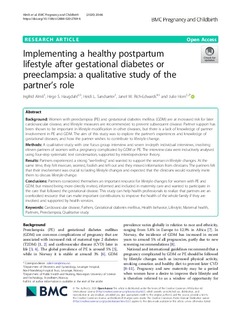| dc.contributor.author | Almli, Ingfrid | |
| dc.contributor.author | Haugdahl, Hege Selnes | |
| dc.contributor.author | Sandsæter, Heidi Linn | |
| dc.contributor.author | Rich-Edwards, Janet Wilson | |
| dc.contributor.author | Horn, Julie | |
| dc.date.accessioned | 2020-02-13T11:35:04Z | |
| dc.date.available | 2020-02-13T11:35:04Z | |
| dc.date.created | 2020-02-09T20:04:07Z | |
| dc.date.issued | 2020 | |
| dc.identifier.issn | 1471-2393 | |
| dc.identifier.uri | http://hdl.handle.net/11250/2641513 | |
| dc.description.abstract | Background
Women with preeclampsia (PE) and gestational diabetes mellitus (GDM) are at increased risk for later cardiovascular disease, and lifestyle measures are recommended to prevent subsequent disease. Partner support has been shown to be important in lifestyle modification in other diseases, but there is a lack of knowledge of partner involvement in PE and GDM. The aim of this study was to explore the partner’s experiences and knowledge of gestational diseases, and how the partner wishes to contribute to lifestyle change.
Methods
A qualitative study with one focus group interview and seven in-depth individual interviews, involving eleven partners of women with a pregnancy complicated by GDM or PE. The interview data were inductively analysed using four-step systematic text condensation, supported by interdependence theory.
Results
Partners experienced a strong “we-feeling” and wanted to support the woman in lifestyle changes. At the same time, they felt insecure, worried, foolish and left out and they missed information from clinicians. The partners felt that their involvement was crucial to lasting lifestyle changes and expected that the clinicians would routinely invite them to discuss lifestyle change.
Conclusions
Partners considered themselves an important resource for lifestyle changes for women with PE and GDM, but missed being more directly invited, informed and included in maternity care and wanted to participate in the care that followed the gestational disease. This study can help health professionals to realize that partners are an overlooked resource that can make important contributions to improve the health of the whole family if they are involved and supported by health services. | nb_NO |
| dc.language.iso | eng | nb_NO |
| dc.publisher | BMC (part of Springer Nature) | nb_NO |
| dc.rights | Navngivelse 4.0 Internasjonal | * |
| dc.rights.uri | http://creativecommons.org/licenses/by/4.0/deed.no | * |
| dc.title | Implementing a healthy postpartum lifestyle after gestational diabetes or preeclampsia: a qualitative study of the partner’s role | nb_NO |
| dc.type | Journal article | nb_NO |
| dc.type | Peer reviewed | nb_NO |
| dc.description.version | publishedVersion | nb_NO |
| dc.source.volume | 20 | nb_NO |
| dc.source.journal | BMC Pregnancy and Childbirth | nb_NO |
| dc.source.issue | 66 | nb_NO |
| dc.identifier.doi | https://doi.org/10.1186/s12884-020-2769-6 | |
| dc.identifier.cristin | 1792392 | |
| dc.description.localcode | © The Author(s). 2020 Open Access This article is distributed under the terms of the Creative Commons Attribution 4.0 International License (http://creativecommons.org/licenses/by/4.0/) | nb_NO |
| cristin.unitcode | 194,65,20,0 | |
| cristin.unitname | Institutt for samfunnsmedisin og sykepleie | |
| cristin.ispublished | true | |
| cristin.fulltext | original | |
| cristin.qualitycode | 1 | |

